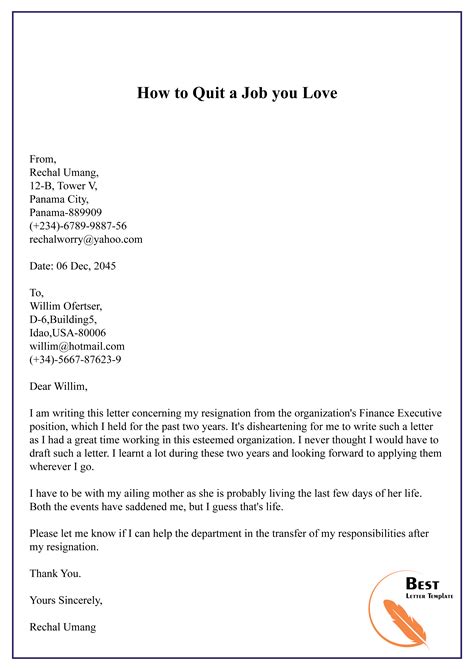Sample Resignation Letter For Quitting: Guide & Tips

Resigning from a job can be a tough decision, but sometimes it is necessary to move on to new opportunities or situations. Writing a resignation letter is an important step to take when leaving a job, as it is a formal way of informing your employer of your decision to quit. In this guide, we will provide tips and a sample resignation letter to help you navigate the process of quitting your job.
Why Write a Resignation Letter?
Writing a resignation letter is an important part of the quitting process. Here are some reasons why:
- It is a professional way to inform your employer of your decision to leave
- It provides a written record of your resignation
- It helps to maintain a positive relationship with your employer
- It can be used as a reference for future employment opportunities
What to Include in a Resignation Letter
When writing a resignation letter, it is important to include the following information:
- Your name and contact information
- Date of the letter
- The name and contact information of your employer
- A statement of your intention to resign
- The date of your last day of work
- A brief explanation for your resignation (optional)
- A thank you message to your employer and colleagues
- Your signature
Sample Resignation Letter
Here is a sample resignation letter that you can use as a guide:
[Your Name]
[Your Address]
[City, State ZIP Code]
[Your Phone Number]
[Your Email Address]
[Date][Employer Name]
[Employer Address]
[City, State ZIP Code]Dear [Employer Name],
I am writing to inform you of my decision to resign from my position as [Your Position] at [Company Name]. My last day of work will be [Date of Last Day].
I have made this decision after much consideration and have come to the conclusion that it is time for me to move on to new opportunities. I want to thank you for the support and guidance you have provided me during my time at the company.
Please let me know if there is anything I can do to assist with the transition process. I am committed to ensuring a smooth handover of my responsibilities.
Again, thank you for the opportunity to be a part of this team. I wish you and the company all the best in the future.
Sincerely,
[Your Signature]
[Your Name]
Tips for Writing a Resignation Letter
Be Professional
When writing a resignation letter, it is important to maintain a professional tone. Avoid using emotional language or criticizing your employer or colleagues. Keep the letter brief and to the point.
Give Notice
It is important to give your employer sufficient notice of your intention to resign. This can help to ensure a smooth transition for both you and your employer. Two weeks’ notice is a common practice, but you should check your employment contract or company policy to see if a different notice period is required.
Express Gratitude
It is always a good idea to express gratitude to your employer and colleagues for the opportunities and experiences you gained while working at the company. This can help to maintain a positive relationship and may be beneficial in the future.
Offer Assistance
If possible, offer to assist with the transition process. This can include training your replacement or completing outstanding tasks before your last day of work. This can help to ensure a smooth handover of your responsibilities.
Proofread Your Letter
Before submitting your resignation letter, be sure to proofread it carefully. Check for spelling and grammar errors, and ensure that all information is accurate and up-to-date.
Conclusion
Writing a resignation letter can be a challenging task, but it is an important part of the quitting process. By following the tips and using the sample resignation letter provided in this guide, you can ensure that your resignation letter is professional, courteous, and effective.
FAQs
What should I include in a resignation letter?
A resignation letter should include your name and contact information, the date of the letter, the name and contact information of your employer, a statement of your intention to resign, the date of your last day of work, a brief explanation for your resignation (optional), a thank you message to your employer and colleagues, and your signature.
How much notice should I give when resigning?
Two weeks’ notice is a common practice, but you should check your employment contract or company policy to see if a different notice period is required.
Should I express gratitude in my resignation letter?
Yes, it is always a good idea to express gratitude to your employer and colleagues for the opportunities and experiences you gained while working at the company.
Should I offer to assist with the transition process?
If possible, it is a good idea to offer to assist with the transition process. This can help to ensure a smooth handover of your responsibilities.
